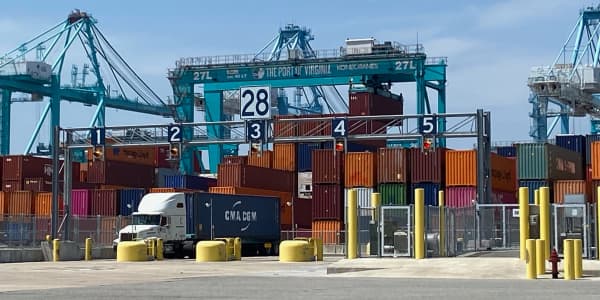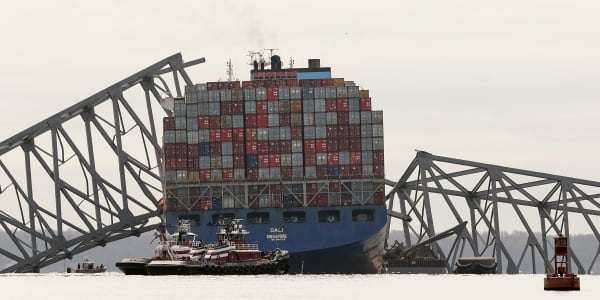The clock is ticking for the International Longshore and Warehouse Union of Canada to conduct an all-union vote to gain approval for a tentative deal with port management that was agreed to on Sunday. Fears are still running high throughout a supply chain already upended by two weeks of striking at Canada's West Coast ports.
The Canada Industrial Relations Board has directed the union to vote no later than Friday, August 4, but so far, the ILWU Canada has provided no information on how the vote among its members will be conducted. Last week, union members rejected the original deal proposal in a two-day vote. In that case, the ILWU provided guidance on a one-shift work stoppage so union members could review the tentative deal ahead of a vote that would span two days. So far, the union has not indicated that a work stoppage or a two-day vote is needed for the current proposal. The lack of a more specific timeline for this vote continues to add to uncertainty at the ports.
In a Facebook post about the current tentative deal under review, the union posted the signatures of all five union locals publicly stating their support. Included among those signatories are individuals who led the decision to vote down the first tentative agreement, according to sources close to the deal who requested anonymity given the sensitive nature of the talks.
"We cannot afford broken supply chains," said Paul Brashier, vice president of drayage at ITS Logistics. "Our clients are facing about a two-month delay in the delivery of their product."
Canadian Labor Minister Seamus O'Regan tweeted on Monday morning about the tentative deal, citing its importance for "long-term stability."
That original deal proposal — which was disclosed by the British Columbia Maritime Employers Association, which negotiates for port ownership — increased the compounded wage over four years by 19.2%. A signing bonus of $1.48 an hour per employee, which tallied to approximately $3,000 per full-time worker, was included. There was also an 18.5% increase in the retirement payout.
In a pushback against the union argument that worker salaries were unsustainable against rising inflation, the BCMEA had stated that over the past 13 years, longshore wages have risen by 40%, ahead of inflation at 30%.
Rob Ashton, president of ILWU Canada, who was among the signatories supporting the new deal, pointed to other key issues for the union in a statement issued on Sunday. "The critical issue is the practice of contracting out maintenance work that poses a significant threat to job security and the integrity of the LWU workforce," he wrote. "We are deeply concerned if left unchecked, this practice will lead to an erosion of our workforce and expertise, ultimately jeopardizing the stability and efficiency of Canada's maritime industry."
Ashton said union members view work stoppages as a last resort.
Supply chain snags
The labor strife has crippled the Canadian ports and inbound U.S. trade. A 14-day strike has led to more than 16 canceled sailings to the Canadian ports, according to maritime intelligence company, eeSea.
Changes to vessel routes impact the profitability of railroads Canadian Pacific Kansas City and Canadian National Railway, since fewer containers will now be unloaded at U.S. ports. This decrease in containers also impacts trucking companies. On the flip side, the extra containers coming into U.S. ports will add to the profitability of U.S. trucking companies and railroads BNSF, a subsidiary of Berkshire Hathaway, and Union Pacific. Over the long term, if Canadian trade is rerouted to the East Coast that would also benefit Norfolk Southern and CSX.
The strike has already hit the bottom lines of railroad companies. The labor unrest will negatively impact Canadian Pacific Kansas City railroad's revenue by $80 million, chief marketing officer John Brooks told analysts on a conference call Thursday. Brooks said the company is working to claw back those losses over the third and fourth quarters.
Canadian National Railway announced it was running additional trains to help expedite the clearing out of the container congestion.
The Railway Association of Canada originally estimated that it would take three to five days for every day the strike lasted for networks and supply chains to recover. When the first strike ended on its 13th day, delays for rail containers were estimated at 39 to 66 days. Adding another day with the on-again, off-again strike last week brought the congestion removal tally up to 42 to 70 days.
"Delays appear to be bearing out toward the mid-to-upper end of that range," a Railway Association of Canada spokesperson wrote in an email to CNBC.
The timing of this strike adds unnecessary hurdles to peak season when holiday items are arriving for retailers. At the height of the strike, $12 billion in freight was stranded on the water. Some of that trade was diverted on vessels that called on ports on the U.S. West Coast.
Steve Lamar, CEO of the American Apparel and Footwear Association, said his group estimated that the first strike would cause an average of six to eight weeks of supply chain disruption before conditions return to normal. AAFA had called on the Canadian government to step in during the first strike.
For the third week in a row, rail traffic from Canada into the U.S. is down following the labor actions at the western Canadian ports. The first two weeks of the labor strike prevented more than 80% of rail trade from entering the United States. The U.S. saw another 12% decrease in trade this week.





